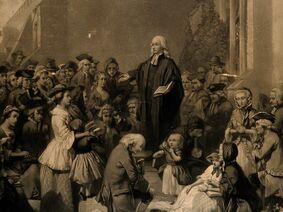 The Bible is the Word of God The Bible itself teaches its divine origin and authority: "No prophecy of Scripture came about by the prophets'own interpretation." 2 Peter 1:20 All Scripture was written as: "Men spoke from God as they were carried along by the Holy Spirit." 2 Peter 1:21 "God Spoke . . . through the prophets . . . and by His Son." Hebrews 1:1-2 "All Scripture is God-breathed." 2 Timothy 3:16 The Word of God, once given and written, is exact in all details down to each letter and stroke of the pen. Matthew5:18 "The Scripture cannot be broken." John 10:35 "The Word of the Lord stands forever." 1 Peter 1:25  The Gospel accounts are based on careful research, historical facts and eye-witness testimonies: "They were handed down to us by those who from the first were eye-witnesses and servants of the Word. Therefore, since I myself have carefully investigated everything from the beginning, to write an orderly account... so that you may know the certainty of the things you have been taught." Luke 1:2-4 "That which was from the beginning, which we have heard, which we have seen with our eyes, which we have looked at and our hands have touched this we proclaim concerning the Word of Life. The Life appeared; we have seen it and testify to it... We proclaim to you what we have seen and heard." 1 John 1:1-3 The Bible presents itself as God's revealed Word. On almost every page we find "The Lord said...", "God spoke...", "The Word of the Lord came... "The Apostles believed that they were speaking under the inspiration of The Holy Spirit (1 Cor. 2:4; 15:3; 1 Thess. 2:13; 4:15; 2 Peter 3:2; Gal. 1:6-12; Rev. 22:18, 19). Jesus regarded the Old Testament as the Authoritative Word of God (Matt. 4:4; Mark 14:27; Matt 19:4; Mark 7:11-13; John 10:34, 35; Luke24:25-27,44). Jesus also taught that His Words had a unique power and life (John 6:63; 15:3), that they would not pass away (Mark 13:31) and that they must be heard and obeyed (Matt. 5:17-48; 7:24; John 8:31-38; 14:23).  We cannot accept the authority of Jesus without accepting the authority of the Old Testament which He lived, taught, appealed to and fulfilled. We also have to recognise that Jesus deliberately chose and trained certain men to be His apostles (Luke 5:27; 6:12-16; John 17:6) and gave them a special anointing with the Holy Spirit (John 20:21; Acts 1:8), promising them the Holy Spirit to guide their teaching (John 14:26; 15:26; 16:13). This compels one to also accept the authority of the New Testament. We can also appeal to fulfilled prophecy, archaeological discoveries, manuscript evidence and historical records to support these internal evidences to the accuracy and uniqueness of the Bible. Most powerfully, however, we can point to the unique impact of the Bible on millions of lives throughout the centuries and on our own as well. Some sceptics may not believe that the Bible is the Word of God but they are choosing to ignore a lot of accumulative evidence to do this.  Jesus is The Only Way to God The Bible teaches that there is only one way of salvation: "For there is one God and one mediator between God and men, the man Christ Jesus, who gave Himself as a ransom for all men." 1 Timothy 2:5, 6 Our Lord Jesus Himself declared that there is only one way to God: "Jesus answered, 'I am the Way and the Truth and the Life. No one comes to the Father except through Me'." John 14:6 This has been the Apostolic Message from the very beginning: "Salvation is found in no one else, for there is no other name under heaven given to men by which we must be saved." Acts 4:12 Jesus is God in Human Form The first disciples of Christ, being Jews, had the highest regard for the Old Testament Scriptures. It was the Word of God. Yet it was definitely incomplete: it spoke of a day when God would judge the earth; of a king from David's line whose kingdom would never end. It spoke of all the families of mankind being blessed by Abraham's seed. It spoke of a prophet like Moses arising from among the people, whose teaching would be unparalleled. It spoke of a Servant of the Lord, whose death would atone for the sins of the people, of one who would make a New Covenant between God and men; one who would put the Spirit of the Lord into the hearts of men so that they could know God personally and have their sins wiped out. It spoke of a stone, despised by the builders, which would be come the keystone. It spoke of one like a Son of Man, who would receive authority, honour and royal power so that people of all nations, races and languages would serve Him. It spoke of a priest like the legendary Melchizedek, whom the Almighty would call Lord and welcome to His throne. It spoke of a coming Messiah, who would be born of the tribe of Judah, from David's line, in Bethlehem. He would be despised and rejected by the very people He came to rescue. He would die among wicked men and His tomb would be supplied by a rich man. Yet, He would live again, forever, and the Lord's purpose would succeed through Him.  All of this was fulfilled by Jesus! Not some, or much, of it all of it! prophecies made by many prophets over a thousand years and more were all fulfilled by one historical person. And what mighty prophecies they were too. In the Old Testament,Yahweh is the only Saviour there is -"I, even I, am the Lord and apart from Me there is no Saviour." Isaiah 43:11 "And there is no God apart from Me, a righteous God and a Saviour; there is none but Me." Isaiah 45:21 Yet in the New Testament, Jesus is hailed as - "Our Great God and Saviour, Jesus Christ." Titus 2:13 His very name, Jesus, means "Yahweh saves." "You are to give Him the name Jesus, because He will save His people from their sins." Matthew 1:21 Both God's role and His Name as Saviour are attributed to Jesus in the New Testament. Jesus claimed the power to forgive sins (Mark 2:7-10; Luke 7:48) and He is seen as the Saviour of sinners (John 3:17; Acts 4:12; Gal. 1:4; Heb. 9:26). He raised the dead (Mark 5: 35-43; Luke 7:11-17,22; John 11) and He gives eternal life to all who now believe in Him (Mark 10:21; John 3:16; 5:24; 1 John 5:11, 12).  In the Old Testament Yahweh alone is the Judge (Dan. 7:9, 10; Psalm 99; Deut. 32). Yet Jesus claimed this uniquely divine function in the New Testament "For we must all appear before the judgement seat of Christ, that each one may receive what is due to him for the things done while in the body, whether good or bad." 2 Corinthians 5:10That Yahweh alone is the Creator of all things is basic to the Old Testament (Genesis 1; Psalm 33:6-9; Isaiah 42:5). Yet the New Testament reveals that through Jesus all things came into being (John 1:1-3; Heb. 1:2; 1 John 1:1), and that Jesus is the sustainer and upholder of all things (Matthew28:18; 1 Corinthians 8:6). Yahweh alone is worthy of worship, and to worship any other being than the Lord God would be the worst and most fundamental of all sins (Exodus 20:3-6; Deut. 6:4-15). Yet prayers are addressed to Christ (Acts 7:59; 9:13; 1 Cor. 16:22; Rev. 22-20); Doxologies are ascribed to Him Old Testament worship passages are transferred from Yahweh to Christ The disciples worshipped Jesus and when Thomas said to Him: "My Lord and my God!" (John 20:28 ), far from rebuking him, Jesus merely suggested that he should have believed earlier. The book of Revelation also presents the most unambiguous assertion of Deity when it records the great worship of Christ in heaven - "Worthy is the Lamb, who was slain to receive power and wealth and wisdom and strength and honour and glory and praise!"Revelation 5:12  Even the Name of Yahweh is ascribed to Christ. When the Old Testament was translated into Greek in the 2nd Century B.C. the Sacred Name of God, YHWH, usually rendered Yahweh, was translated into the Greek word Kyrios it is a clear statement of Christ's deity. The confession "Jesus is Lord" tells it all. Certainly the title "Lord of Lords" (1 Tim. 6:15; Rev. 17:14; 19:16) cannot be interpreted any other way than that Jesus is God incarnate. There are also many occasions where the New Testament applies Old Testament passages concerning Yahweh directly to Jesus - e.g. Psalm 110:1 in Acts 2:34,35; Rom. 8:38; Heb. 10:12,13; 1 Peter 3:22; Isaiah 6:10 in John 12:41; Isaiah 45:23 in Phil. 2:9-11; Joel 2:32 in Rom. 10:13 and Psalm 68:18 in Eph. 4:8). A supreme example of this is John the Baptist's ministry to "Prepare the way for the Lord (Yahweh)" Matthew 3:3, which is a direct quote from Isaiah 40:3, which unmistakably refers to God Himself. Of great significance is Jesus' self-designations as the I AM (John 6:35; 8:12,24,58; 11:25; 14;6; 15:1, 5; 18:5). This is a deliberate identification with God's revelation of Himself in Exodus 3:14 as "I AM". All this is conclusive and the accumulative proof of all these evidences of the Deity of Christ is overwhelming. Yet even further proof could be sought in the Resurrection (Rom. 1:4). The atheists have yet to explain away the hard historical facts of The empty tomb, The eye-witness accounts of those hundreds who saw Christ alive again (1 Cor. 15:4-8), The transformation of the disciples and even the existence of the Church (represented by over two million church buildings and 1 800 million members).  The very Names of Jesus (Yahweh Saves), Messiah (God's Anointed One), Son of Man (the Lord and Judge of all revealed in Daniel 7:13, 14), Emmanuel (God with us), and The Son of God, point to His Deity. His uniquely perfect and sinless life, and His teaching - which are unsurpassed in authority, clarity, insight and power - all this can only support the Biblical claims for the Deity of Christ. It is upon this solid foundation of accumulative evidence that the Church of Christ based its great ecumenical creed of Nicea: "We believe in one Lord Jesus Christ, the Son of God, begotten of the Father, only-begotten, that is of the substance of the Father, God of God, Light of Light, true God of true God, begotten not made, of one substance with the Father, through whom all things were made, things in heaven and things on the earth; who for us men and for our salvation came down and was made flesh and became man, suffered and rose on the third day, ascended into the heavens, is coming to judge the living and the dead." What does this mean for us?
The glorious truth of the Incarnation is that God has made Himself known personally, specifically and fully by taking our human nature unto Himself, by coming amongst us as a particular man, yet without ceasing to be the infinite, transcendent and eternal God. God has in Christ taken upon Himself the responsibility and penalty for the sins of the world. God has borne the brunt of suffering and evil by subjecting Himself to its cruelty and horror. The Incarnation reveals the reality and depth and costly nature of His Love, Holiness, Justice and Mercy. Jesus is the Eternal Son of God, who became incarnate to reveal God to us and to reconcile us to Himself. He is the second person of the Trinity, God revealed in human form. Jesus is God, and so we have a full and final revelation and redemption in and through Him. Rev. Peter Hammond Frontline Fellowship P.O. Box 74 Newlands, 7725 CapeTown, South Africa. Tel: (021) 689 4480. Fax: (021) 685-5884. E-mail: [email protected]
0 Comments
Leave a Reply. |
Answering SkepticsARTICLES
All
Archives
April 2021
|


 RSS Feed
RSS Feed